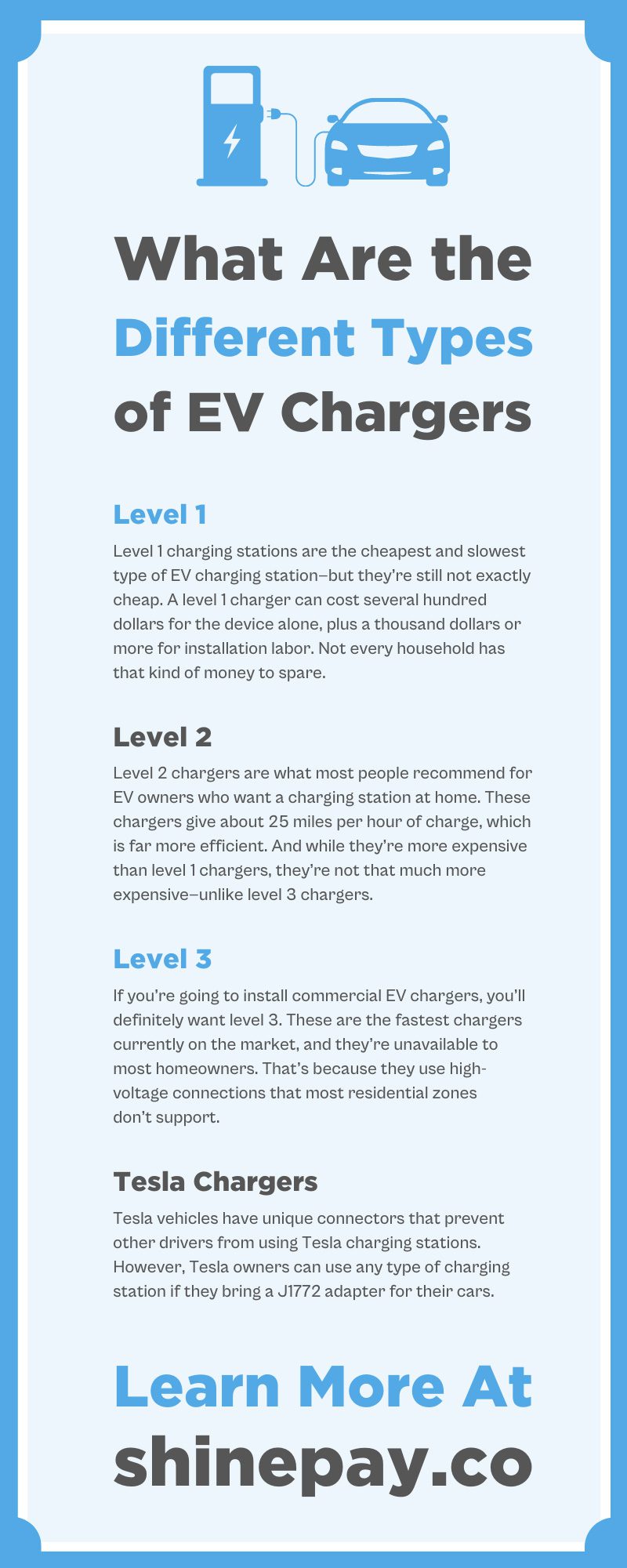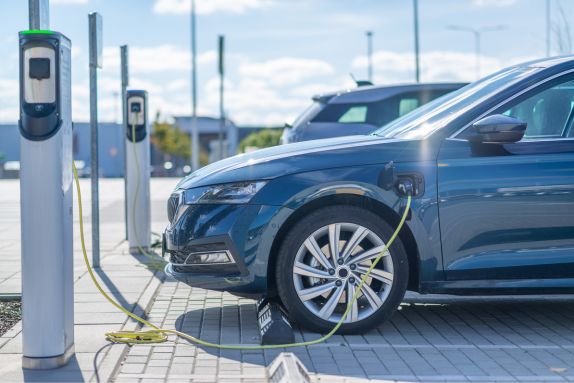A few decades ago, the idea of everyone switching to electric-powered cars seemed ridiculous. Today, it’s becoming more and more of a reality, thanks to upgrades in electric car battery tech. EVs can now hold a charge much longer, and more charging stations are available nationwide. If you own a business and are considering installing charging stations on your property, here’s what you need to know about the different types of EV chargers.
The Growing EV Market
EVs are becoming more and more popular, thanks to rising gas prices and concerns about our planet’s future. In 2022, over 10 million people bought an EV, which was a 60 percent increase from the previous year. That’s a huge growth for the EV industry! That also means more EVs are out on the road than ever before. For businesses looking to make money from installing EV chargers, now is a good time to get started.
Federal EV Charger Goals
The federal government has recently passed laws providing funding for state organizations and businesses that install EV chargers for public use. They have several motives for promoting EVs. For one, most of the oil and gas that US citizens use in their cars come from other countries. Countries that control the global oil supply can greatly influence how much it costs to purchase oil. Helping people in the US switch to EVs makes the US more economically independent.
How the Federal Funding Works
The federal government’s plan is to give funds to the states, which can then use that money to install EV chargers around major road networks. There are extra bonuses for installing EV chargers in urban areas to make EVs viable options for low-income households.
While businesses can’t apply for the federal funds directly, they can talk to local and state governments about funding partnerships. Many cities have programs to cover part of the cost of EV chargers for commercial property owners. If you’re interested in adding EV chargers to your property, contact your local department of transportation to learn what opportunities are available.
EV Chargers and Your Business
Having EV charging stations on your property can help give your business a boost in profits. There are two main ways that EV chargers do this. Firstly, once people learn that you have charging stations on your property, they’ll make a point of coming to your business to charge their vehicles. This is just like when people develop favor for a particular gas station. By attracting regulars to your property, you’ll diversify your revenue streams.
The second thing that happens when you put EV chargers on your property is that people will visit your business more often. Even the fastest chargers may take 10–20 minutes to fully charge, meaning people need a way to pass the time. If you have a store nearby, they’ll wander in and possibly buy something.
The Types of EV Chargers
It may seem pretty basic, but to drive a battery-powered vehicle, you have to charge the battery. The most convenient way to do this is charging your EV at home when you’re not using it, but having your own EV charger can be easier said than done. Mainly, not everyone has a garage to house a charging station. For EVs to be truly accessible, people need public charging stations.
Also, one thing to know about the different types of EV chargers is that you need access to the right voltage. EVs charge most quickly on high-voltage connectors. However, residential power lines don’t usually accommodate these kinds of connections. Therefore, businesses are in much better positions to offer rapid, accessible charging stations.
Level 1
Level 1 charging stations are the cheapest and slowest type of EV charging station—but they’re still not exactly cheap. A level 1 charger can cost several hundred dollars for the device alone, plus a thousand dollars or more for installation labor. Not every household has that kind of money to spare.
Level 1 chargers typically use AC power, and they provide about 5 miles of range for every hour of charging. If you’re only using your car for short distances, you might be able to get by with a level 1 charger. However, you’ll need to wait a long time between outings in your vehicle.
Level 2
Level 2 chargers are what most people recommend for EV owners who want a charging station at home. These chargers give about 25 miles per hour of charge, which is far more efficient. And while they’re more expensive than level 1 chargers, they’re not that much more expensive—unlike level 3 chargers.
With a level 2 charger at home, you can easily commute farther for work. With a faster charging rate, it’s more likely that you’ll have time to fully recharge your car before the next day.
Level 3
If you’re going to install commercial EV chargers, you’ll definitely want level 3. These are the fastest chargers currently on the market, and they’re unavailable to most homeowners. That’s because they use high-voltage connections that most residential zones don’t support.
Level 3 chargers can vary widely in speed. The slowest still offer about 100 miles of range for just 30 minutes of charging, while the fastest can charge 200 or more miles in that same time.
If you plan to install level 3 chargers, check with your state or municipal government to see if there is a funding program you can apply to. Level 3 chargers can cost tens of thousands of dollars, which makes them the most expensive type of EV chargers by far.
Tesla Chargers
Tesla vehicles have unique connectors that prevent other drivers from using Tesla charging stations. However, Tesla owners can use any type of charging station if they bring a J1772 adapter for their cars.
For business owners who are considering putting commercial chargers on their property, it’s a good idea to offer a variety of connections to accommodate all EVs, no matter the manufacturer.
Making EV Chargers Smarter
To make your charging stations even more attractive to patrons, you should consider combining technologies. Since most people don’t carry cash anymore, it makes sense to combine EV chargers with app payment technology. ShinePay offers commercial EV smart chargers for Tesla and non-Tesla EVs.
When someone wants to use your charging station, all they have to do is download the app, scan the charger, and pay. It’s that easy! Contact ShinePay today for more information.

